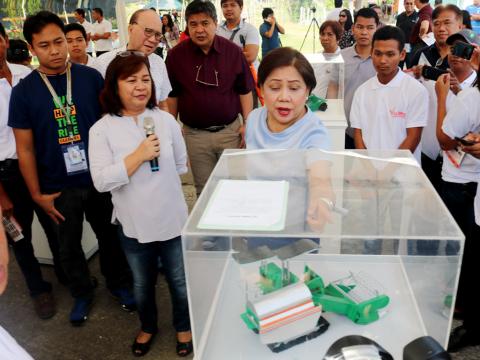ATI, PHilMech, and PhilRice officials join Senator Cynthia Villar as she tours around the mini exhibit prior to the closing program of the Training Course on the Production of High-quality Inbred Rice Seeds and Farm Mechanization Batch 2.
SAN JOSE DEL MONTE, Bulacan—The use of high quality seeds and farming machinery is what the Department of Agriculture (DA), its bureaus and agencies, and partner organizations see as key for the sufficiency, security, profitability, and competitiveness of rice production the country.
“Our thrust now is about ‘Quality Rice, Quality Life’, and quality rice starts with quality seeds. We also included farm mechanization in this training because we know that labor cost is high when it comes to production. We believe that through these, we can be at par with other countries like Vietnam and Thailand,” Philippine Rice Research Institute (PhilRice) Deputy Executive Director for Development Karen Eloisa Barroga said.
Barroga was among the DA officials who graced the opening and closing ceremonies of the Training Course on the Production of High-quality Inbred Rice Seeds and Farm Mechanization Batch 2 held this month. She furthered that the use of high-quality seeds of the recommended variety gives farmers five to 20 percent increase in yield, given the right conditions.
The training is part of the ongoing collaboration among the DA, PhilRice, Philippine Center for Postharvest Development and Mechanization (PHilMech), Agricultural Training Institute (ATI), and Villar Social Institute for Poverty and Governance (Villar SIPAG). This is to capacitate more rice farmers in the country to produce high-quality inbred rice seeds and promote its use.
They 10-day training included lectures and hands-on sessions on the PalayCheck system, seed certification standards, farm machinery safety, land preparation, seedling preparation, transplanting, harvesting, threshing, drying, among others. A total of 31 farmers from different areas in Luzon were part of the second batch.
Senator Cynthia Villar, head of the Senate Committee on Food and Agriculture and managing director of Villar SIPAG, brought some good news to the participants during the closing program. She shared the proposed legislation for rice competitiveness enhancement fund which will make farm machinery, loans, and training programs easily available to farmers.
Through this enhancement fund, all 1,100 cities and towns in the country will receive Php1 million to Php5 million worth of farm machinery grants through PHilMech in the next six years. Other fund allocations will go to training of trainers on rice seed production and the establishment of farm schools in rice-producing areas in the country.
“We have to produce good seeds that will improve harvest per hectare. The highest harvest so far is four metric tons (MT) per hectare in the provinces. With the proper seeds, you [farmers] can increase yield from four to six MT, thereby increasing production and income by 50 percent,” Villar said.
Villar also urged the graduates to teach other farmers in their respective areas what they have learned from the training, “When you do so, we will be able to help our rice farmers out of poverty. They can earn more and become competitive. Through this, we can cut back on importation, [which is an advantage] particularly in this age of [trade] liberalization.”
The said training was held on November 7-16, 2018 at the PhilRice Central Experiment Station and at PHilMech in Muñoz, Nueva Ecija. During the closing program on November 17, held at the Villar SIPAG Farm School in this city, the participants received their training certificates. They also took part in the PhilRice mini exhibit of rice seed varieties, rice-based products, mobile applications, knowledge products, and farm equipment.

